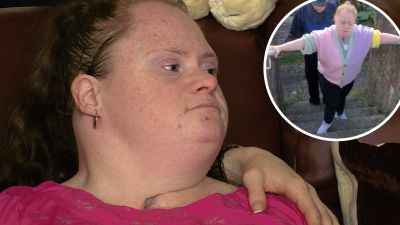Disabled woman becomes 'prisoner in own home' due to unsuitable Barry accommodation

By ITV Wales Journalist Zaynub Akbar
A disabled woman from Barry has become a "prisoner in her own home" due to the unsuitability of the social housing property where she lives.
Nadya Walker, 34, and her mother Patsy Cann, 65, have lived in the bungalow in Barry since 2019 but say it is "unsuitable" for Nadya's medical needs.
Nadya was born with Down's syndrome, suffers from heart and lung problems, limited mobility and was recently diagnosed with scoliosis.
The pair are forced to climb steep steps each time they want to leave their home, which Nadya can no longer do.
There is also a long path around the estate which has been deemed "too dangerous" for a wheelchair given the uneven ground - with Nadya once falling onto the floor.
Doctors have explained Nadya is "going to get progressively worse" and Patsy says the situation has left her feeling like a "prisoner in her own home".
In addition, Nadya's scooter has since broken and will cost hundreds of pounds to fix, meaning "she has lost her independence", Patsy said.
The family claim to have been "pressured" out of their previous social home four years ago, which was suitable for Nadya's needs, after they were forced to pay extra because the property had more bedrooms than occupants.
"I couldn't afford it, I had to borrow from family and friends just to pay the bedroom tax", Patsy said.
Despite constantly bidding on properties which they say meet their needs, they have been unsuccessful.
"What's the reason we're not being offered anything? Why are we still in here three years later as prisoners? The situation isn't going to get any better with Nadya, it's getting worse. Why are we not being offered these properties that do meet our needs?"
When it comes to bidding on suitable social homes, Patsy explained: "Every week when I look at the adverts and I see one, I'll go around and I thought 'Right, I'll go for this' - start packing again, wait and wait and wait, phone up and say 'have I had any news about this?' You'll either hear from a telephone call or a letter - never ever comes."
Asked how the situation is impacting her as both a mother and a carer, Patsy said: "Really upset, really. I hate seeing her in pain, I really do. And I can hear her crying at night time in bed trying to turn over.
"My depression has hit the floor, totally. I know Nadya's depression, she's the same because she's a prisoner in here."
Patsy has osteoarthritis and mobility issues herself, which make it harder to care for Nadya when it comes to carrying her and and pushing her wheelchair.
It's clear that the family want answers and to live in a home where they have access to the outside world.
"She [Nadya] loves people, absolutely loves people - a people person", Patsy said.
In response to Patsy and Nadya's situation, a spokesperson for the Vale of Glamorgan Council said: "The Council is acutely aware of Mrs Cann’s situation and is doing everything possible to assist. Mrs Cann has a live application on Homes4U, the Council system for allocating housing, and has been awarded the highest priority in recognition of her and Nadya’s medical requirements.
"Their needs have been assessed by an Occupational Therapist who has recommended they be homed in a fully accessible bungalow or ground floor flat that has a level access wet room. Unfortunately, there is a shortage of these types of homes which has led to a delay in rehousing.
"Prior to moving into her current home three months ago, Mrs Cann lived in an adapted housing association property, but wanted to move to a bungalow for health and medical reasons. Mrs Cann applied for her current property and accepted the offer. The Council strongly refutes the suggestion she was pressured into doing so. We are eager to find Mrs Cann a more suitable property and will do so as soon as one becomes available. In the meantime, staff will continue to provide advice and support."
When asked why some wheelchair users aren't being offered homes that are suitable for their needs, Housing Minister Julie James MS explained: "So we've just changed the way we do adaptations to our homes.
"We've taken away the means testing for adaptations for medium-sized ones and we've enabled our local authorities with much bigger grants to do the adaptations more quickly.
"So we're very, very keen that people do get the adaptations they need to the housing, so that they can have access to them. Also then, that when we build new, we build houses that are level, that have wide doorways."